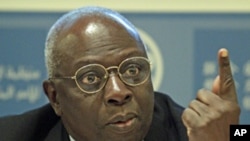The response to the drought and hunger crisis in the Horn of Africa should include steps to prevent the humanitarian disaster from happening again. That is according to Jacques Diouf, director-general of the UN Food and Agriculture Organization. FAO is hosting a meeting of officials and experts in Rome Thursday to identify areas of need and plan responses.
The United Nations is seeking about $2 billion in humanitarian relief for drought-stricken countries in the Horn of Africa. The short-term needs are for food and medicine - both for people, and the surviving livestock herders depend on for their livelihoods.
But in the long term, says FAO Director-General Jacques Diouf, the fundamental issue is water. "Unless we control water in that region, we're bound to have similar situations, particularly in the face of climate change," said Diouf.
Diouf says only about one percent of the farmable land in the region is irrigated, compared to about four percent in sub-Saharan Africa as a whole, and nearly forty percent in Asia.
Improving access to water for the region's livestock herders is another key goal.
Farmers also need fertilizer, better seeds and a way to store their crops in order to be more productive, and better access to markets to achieve financial security.
The needs are substantial. But Diouf says the Rome meeting is building on a solid foundation of previous work.
"We have the programmatic tools," he said. "We have the strategies. We have the projects. We have costed them. We have evaluated them. Some governments have started within their limited means to take action. And because they have taken action, they are better prepared now than they were before. But it's still not enough. We need to invest more."
That demand is directed, in part, to African governments. Most have pledged to commit 10 percent of their national budgets to agriculture, but fewer than a dozen have followed through.
Diouf says international donors need to do more, too. He notes that in 2000, a UN task force drew up a long-term strategy to end hunger in the Horn of Africa.
"Unfortunately, the follow-up action to mobilize the resources did not result in concrete action, and here we are again," said Diouf.
The problems go beyond natural and financial resources, however. The FAO chief acknowledges that civil conflicts have hampered development efforts in the region as well.
"Well, first, naturally, we have to do it where there is no civil war, as is the case in Somalia," he said.
The Rome conference will not end the civil war. But Diouf notes there are eight countries in the region threatened with chronic food insecurity. Investments now, he says, can help prevent another crisis later.
FAO says Africa Drought Relief Should Plan for Long Term













